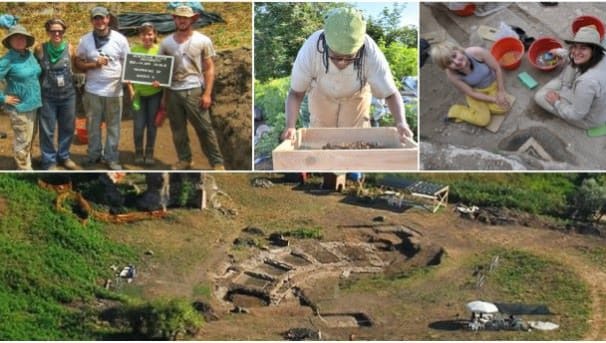Send Students to a 'Dig' in Italy!
This archaeological field project in Genzano di Roma, Italy, now looking forward to its upcoming tenth season in summer 2019, is exploring the remains of a Roman imperial villa located 18 miles from the center of Rome in the Alban Hills region. The “Villa of the Antonines” Project is led by two MSU professors, Roman archaeologist Dr. Deborah Chatr Aryamontri and ancient historian Dr. Timothy Renner. They are assisted by four Italian professionals who are experts in excavation, architectural drawing, and the preservation of building remains. On the basis of ancient literary references and the discovery in the 18th century of marble busts of imperial figures, the villa is believed to have belonged to the second century CE imperial family of the Antonines. Near ruinous concrete pinnacles that once formed part of an ancient bath complex, the MSU excavators are uncovering an amphitheater that is smaller than the Colosseum but, like it, is equipped with rooms and tunnels beneath the arena floor to allow animals and scenic effects to be prepared. A few hundred feet uphill, with a panoramic view of the Mediterranean in the distance, is a series of rooms with mosaic floors decorated with mythical Medusa figures and rich vegetation.
While at the site for four weeks during the summer, student participants receive 6 semester hours of academic credit and take part in all aspects of archaeological field excavation: digging, cleaning and documenting artifacts, and learning about how professionals survey and map an archaeological site and restore its damaged walls and floors. They also get to be part of living, working, and shopping in friendly Genzano, go on field trips with their professors, and visit museums, ancient ruins, modern neighborhoods, and churches in Rome itself.
As you might imagine, sending students on this trip of a lifetime is a costly venture, and the administration of Montclair State has already been very helpful in helping to provide financial assistance. However, given the lack of state government support of institutions of higher learning in New Jersey (NJ ranks near the bottom), we will need more financial support in order to continue this proud tradition.
$100
Field Trip
Sends a student on a field trip to the ancient Roman city of Pompeii or Ostia
$200
On-site Workshop
Makes it possible for a student to take part in a one-day, on-site restoration workshop


